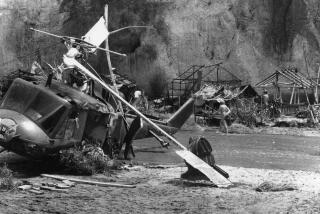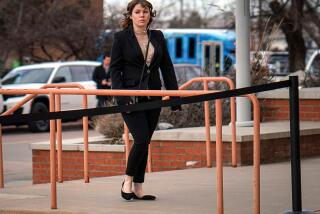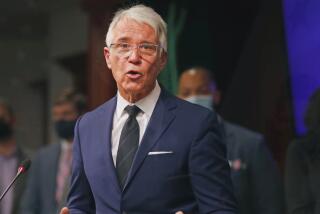D’Agostino Seeks Victory, Not Truth, ‘Zone’ Jury Told
- Share via
Deputy Dist. Atty. Lea Purwin D’Agostino, the prosecutor in the “Twilight Zone” involuntary manslaughter trial, has placed her goal of winning the case above the ideal of pursuing the truth, a defense attorney asserted in his final arguments Thursday.
“It’s time for the prosecution to go back to doing what they do best, or should do best--prosecuting real criminals for real crimes,” said Leonard Levine, who represents unit production manager Dan Allingham.
Allingham, film director John Landis and three associates, none of whom have criminal records, are accused of criminal negligence in the 1982 film set deaths of actor Vic Morrow and two child actors. The three were killed when a helicopter plummeted out of the sky after being struck by the fireball of a special-effects explosion.
Levine contended that although the children were hired illegally, the defendants had no idea that the filming sequence of a mock Vietnam War battle would prove dangerous.
“The (defendants) are not heroes, they’re not martyrs, they’re not saints--but they were not prophets either. And they are not guilty,” Levine declared.
If Allingham had known the scene would prove unsafe, the attorney emphasized, he would never have been flying in the helicopter when it crashed.
Citing trial testimony from the former prosecutor on the case during a two-day argument, Levine said D’Agostino has nonetheless pursued the charges because of her attitude that “the only thing important is winning.”
In his appearance on the witness stand, the former prosecutor, Deputy Dist. Atty. Gary P. Kesselman, had said that D’Agostino once called him into her office and asked him to back the testimony of another witness.
When Kesselman balked, D’Agostino allegedly said, “You’re not important. I’m not important. (The witness) is not important. The only thing that’s important is this case.”
“If that’s the only thing important,” Levine asserted, “it’s easy to say Dan Allingham is reckless.”
Outside court, D’Agostino took exception to the attack on her credibility, noting that Los Angeles Superior Court Judge Roger W. Boren had ruled that she could not take the stand to rebut Kesselman before the jury.
D’Agostino’s Version
D’Agostino, though, has recounted her own version of the Kesselman confrontation to reporters: “What I said was . . . ‘What is important right now is what we are seeking to do. We are not important; it is the overall objective that is important. . . . How can you not corroborate someone who you yourself have told me is the most credible witness you have?’ ”
With jury deliberations expected to finally begin next week in the trial that began last September, defense attorneys have attempted this week to focus the panel’s attention as much on the actions of D’Agostino and an uncharged special-effects crew member as on the five defendants themselves.
Crew member James Camomile, who was granted immunity by the prosecution, testified that he ignited the special-effects explosive that downed the helicopter without first looking up to determine if the aircraft was a safe distance away.
“This was not some novice, this was not some apprentice, this was not some amateur,” said attorney Eugene L. Trope, who represents helicopter pilot Dorcey Wingo. “He didn’t pause long enough. What might have been if he had paused for sufficient time to look? . . . That’s something he’s going to have to live with for a long, long time.”
Attorney Harland Braun, who represents associate producer George Folsey Jr., will deliver the final defense argument Monday. The prosecution will then be allowed a rebuttal, which is expected to feature both D’Agostino and a second prosecutor, who would argue D’Agostino’s credibility in the Kesselman matter.
More to Read
Sign up for Essential California
The most important California stories and recommendations in your inbox every morning.
You may occasionally receive promotional content from the Los Angeles Times.













